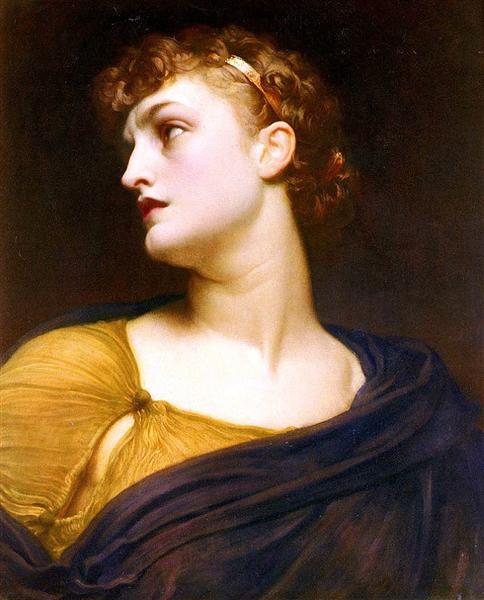Description
Frederic Leighton's 1882 painting Antigone is a work that encapsulates the essence of the neoclassical movement and the symbolism that characterizes much of the artist's work. In this evocative depiction, the central figure is a young woman who personifies Antigone, a tragic character from Greek mythology, whose story focuses on the moral dilemma she faces in wanting to honor her brother, Polynices, in defiance of King Creon's orders. Leighton, known for his masterful ability to capture the human figure in its finest expression, manages to give Antigone a dignity and emotional charge that resonates with the tragedy of her story.
The composition of the work is notable for the way Leighton positions Antigone in an almost stage-like space, with her figure centered and dominating the canvas. The contrast between her figure, dressed in a white robe that folds and flows, and the darker but richly decorated surroundings, establishes a dramatic sense that immediately captures the viewer's attention. This use of space and figure not only reveals Leighton's mastery of the depiction of human anatomy, but also invites reflection on the figure's purpose in tragic narrative.
Colour also plays a crucial role in the work. The choice of warm tones in the background contrasts with the luminosity of Antigone’s clothing, evoking a sense of hope and defiance in the face of adversity. The subtle gradients and rich texture of the colour showcase Leighton’s impeccable technique, using brushwork with great skill to bring the folds of the fabric and the softness of the skin to life. This attention to detail not only enriches the image, but also allows Antigone’s figure to glow with an almost ethereal beauty.
The symbolic aspects of the painting should not be underestimated. Antigone holds a cloak in her hands, which seems to represent or symbolize her duty in life and the sacrifice she is willing to make. This alludes to the young woman's willingness to defy the social conventions and laws of her time in the name of family loyalty and justice. Leighton, in portraying this internal struggle and commitment of Antigone, allows the viewer to delve into the depths of morality and human emotion, recurring themes in her work.
Frederic Leighton, as a painter of the Victorian era, was influenced by classical aesthetics and contemporary symbolism. His style is characterized by a focus on idealized beauty and emotional plot, which is deeply reflected in Antigone. The work not only connects with the rich tradition of academic painting, but also stands in dialogue with other artists of his time who explored similar themes, such as the individual's defiance of social conventions.
In short, Frederic Leighton's Antigone is more than a depiction of a myth; it is an exploration of human tragedy, a study of morality and sacrifice, as well as a magnificent display of painterly technique. The work invites viewers to consider not only the narrative of the young martyr, but also to reflect on their own convictions and the struggle between duty and loyalty. In this sense, Leighton not only captures the tragedy of Antigone, but transforms her story into a powerful symbol of resilience and dignity.
KUADROS ©, a famous painting on your wall.
Hand-made oil painting reproductions, with the quality of professional artists and the distinctive seal of KUADROS ©.
Painting reproduction service with satisfaction guarantee. If you are not completely satisfied with the replica of your painting, we will refund 100% of your money.

